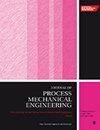Tailoring mechanical, microstructural and toughening characteristics of plasma-sprayed graphene-reinforced samarium niobate coatings for extreme environments
IF 2.2
4区 工程技术
Q2 ENGINEERING, MECHANICAL
Proceedings of the Institution of Mechanical Engineers, Part E: Journal of Process Mechanical Engineering
Pub Date : 2024-09-18
DOI:10.1177/09544089241279724
引用次数: 0
Abstract
Thermal barrier coatings (TBCs) are advanced ceramic layers applied to metal components to provide insulation and protection against high temperatures in extreme operating environments. This study investigated the effects of graphene nanoplatelet (GNP) reinforcement on samarium niobate (SN: SmNbO为极端环境定制等离子喷涂石墨烯增强铌酸钐涂层的机械、微结构和增韧特性
热障涂层(TBC)是一种应用于金属部件的先进陶瓷层,可在极端工作环境中提供隔热和耐高温保护。本研究调查了石墨烯纳米板(GNP)增强对极端环境下铌酸钐(SN:SmNbO4)TBC 的影响。在因科镍合金 718 基材上采用等离子喷涂了四种陶瓷面层成分:它们分别是钇稳定氧化锆(YSZ)、SmNbO4(SN)和添加了 1 和 1.5 wt% GNP 的 SN(SN-1GNP、SN-1.5GNP)。研究考察了微观结构特征、相变、机械性能和增韧机制。GNP 增强明显提高了涂层密度,SN-1.5GNP 的涂层密度达到 97.4 ± 1.64%,而 SN 和 YSZ 的涂层密度分别为 91.3 ± 1.69% 和 86.6 ± 1.47%。SN-1GNP 的硬度和弹性模量分别提高了 86.38% 和 57.91%,SN-1.5GNP 分别提高了 101.09% 和 65.23%。此外,断裂韧性也从 1.86 ± 0.4 MPa-m1/2 显著提高到 5.48 ± 0.7 MPa-m1/2,这得益于溅射桥接、GNP 拔出、裂纹捕捉和铁弹性域切换等增韧机制。此外,SN-1.5GNP 涂层的附着强度更高,达到 36.84 兆帕,从而改善了层分布,降低了分层的几率。与 YSZ 相比,这些研究结果表明,GNP 增强 SN 涂层在极端环境应用中具有更高的性能。
本文章由计算机程序翻译,如有差异,请以英文原文为准。
求助全文
约1分钟内获得全文
求助全文
来源期刊
CiteScore
3.80
自引率
16.70%
发文量
370
审稿时长
6 months
期刊介绍:
The Journal of Process Mechanical Engineering publishes high-quality, peer-reviewed papers covering a broad area of mechanical engineering activities associated with the design and operation of process equipment.

 求助内容:
求助内容: 应助结果提醒方式:
应助结果提醒方式:


